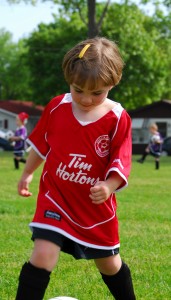The journey to becoming a more complete player begins by building confidence and then learning to maintain it after set¬backs. When a player is confident he expects success. Learning something new then becomes a challenge rather than a problem. The older children become, the more they view learning as something that’s not fun. A good coach can make learning new skills an enjoyable event for his or her team. And it all starts with building confidence. 
Confidence is a choice. A player must choose to become confident. Once the choice has been made, a player must then take responsibility for his actions. Successful players don’t blame someone or something else, which is a sign of insecurity, but instead take responsibility and see setbacks as part of a learning curve, not a disaster that could damage confidence.
A famous player once said “Sometimes in sport you are a hero, sometimes a bum. Today I am a bum, tomorrow I will be a hero.” With this perspective, the player chose to accept the setback and caused no lasting damage to his confidence. He still considered himself to be a great player. The most important self-talk for a player who misses a chance on goal is the phrase “I’ll get the next one,” immediately.
So how can you tell if your players are confident or not? Determining when a player is physically confident is easier than determining if the player is mentally confident, so look for clear messages, both nonverbal and in their play, that the player is confident in his or her ability to succeed.
Players high in confidence are easy to spot. Here are some indicators.
• having a “can do” attitude
• always showing good body lan¬guage
• enjoying competition and having fun
• not worrying about failure or consequences
• being self-dependent, not seeking to blame others
• staying calm and collected, showing good self-control
• talking to themselves and others in an encouraging, positive way
• concentrating well, both in training and in matches
• accepting themselves no matter what
All these characteristics reflect a player’s confidence in his or her ability to cope with the challenge of soccer, which initiates a chain reaction that provides a high level of energy which is the fuel of positive performance.
Pee wee, middle school, and even players in their teens, such as in the 16-and-under suffer from ups and downs in confidence. Be an observant coach and watch your players closely. Sometimes a simple 30 second conversation can be very uplifting to a child that wants to perform well but isn’t reaching his or her own expectations. As a coach, you want players with “controlled” confidence. If they have this style they’ll have more fun, be easier to teach, and ultimately be more successful.


No comments yet.